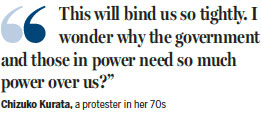TOKYO - Japan's lower house of parliament approved a bill on Tuesday allowing authorities to punish those found guilty of planning serious crimes, legislation that opponents said could be used to undermine basic civil liberties.
The proposed legislation, called the "conspiracy bill", still requires upper house approval.
The government said it's needed to fight terrorism and organized crime, especially before the Tokyo Olympics in 2020.
Lawmakers speaking in support of the legislation pointed to the explosion on Monday in Manchester, England, that killed at least 22 people as a reason for backing the bill.
But thousands of Japanese have taken to the streets to protest what they see as the latest effort to unduly increase police powers.
Opposition lawmakers referred to it as an "evil law".

Japan's history as a police state before and during World War II has made many Japanese wary of granting the government powers that might impinge on personal privacy and other rights.
Hundreds of protesters rallied outside the parliament building on Tuesday, shouting and waving signs and banners to voice their opposition.
"This will bind us so tightly. I wonder why the government and those in power need so much power over us?" said Chizuko Kurata, a protester in her 70s.
A survey by the Kyodo News agency showed that public support for Prime Minister Shinzo Abe's Cabinet fell slightly after the ruling coalition rammed the bill through a committee hearing on Friday.
Kyodo said 77 percent of the 1,033 respondents polled said the government had failed to fully explain the need for the bill. Opinions on the bill were almost evenly divided, however, with slightly more opposed than in favor.
The ruling Liberal Democrats' ability to force through legislation with help from its coalition partner the Komeito raises hackles in harmony-oriented Japan. The two parties intend to win full passage of the bill during the current parliamentary session, and debate in the upper house is likely to be ferocious.
Abe has argued that the bill is needed for Japan to ratify a United Nations treaty on international organized crime that took effect in 2003.
But legal scholars said Japan's criminal code already holds conspirators responsible for criminal acts and mandates punishments for preparing for such crimes.
"In Japan's case, the police already have very broad powers of surveillance. They have other broad powers related to criminal investigations and criminal prosecutions," said Lawrence Repeta, a legal scholar and director of the Japan Civil Liberties Union.
"To add even more at this point would really be overkill," he said.
AP - Xinhua
